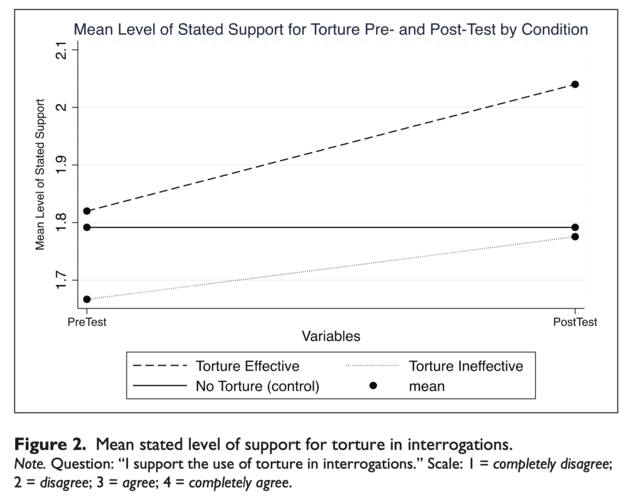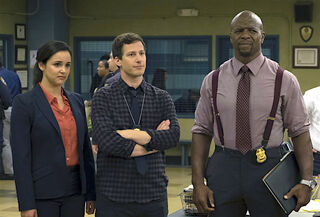Autism
Why TV Is One of the Most Influential Forms of Pop Culture
What we watch on the screen shapes our attitudes and values
Posted May 17, 2021 Reviewed by Lybi Ma
Key points
- Studies show that exposure to members of minority groups on TV can reduce prejudice.
- But one study found that watching a torture scene from the show "24" increased support for torture as a form of interrogation.
- TV shapes our attitudes and how we think about the world.
In 2012, then-Vice President Joe Biden made headlines by publicly endorsing gay marriage, before even President Obama had done so. In explaining his position, he pointed to the role of NBC sitcom Will & Grace: "I think Will & Grace did more to educate the American public more than almost anything anybody has done so far." (The show, which originally aired from 1998 to 2006, co-starred Eric McCormack as a gay lawyer.)
Biden hit on one of the main reasons I find TV so interesting. Sure, it's entertaining. But, perhaps more than any other form of popular culture, it has a tremendous influence on our social and cultural attitudes: What we watch shapes how we think and what we value.
What we watch can help us expand our horizons
For example, in a previous post, I wrote about how seeing members of minority groups on TV can have a small but measurable impact in reducing people’s prejudices. A 2021 meta-analysis led by Elizabeth Levy Paluck even found that these sorts of "entertainment" interventions have one of the largest demonstrated effects in reducing prejudice, larger than more common methods like diversity training.

There's also evidence to suggest that learning about people or events through dramatic portrayals may have a greater impact on people than other learning methods. For example, I've also written specifically about the portrayal of autism on the screen and a study that found that students who watched an episode of The Good Doctor, about a surgeon with autism, later had fewer false beliefs about autism, than students who watched a lecture about autism.
The dark side of the screen's influence
But this powerful influence has a dark side as well. For example, following the murder of George Floyd by police officer Derek Chauvin last year, some people accused shows like Law & Order: SVU and Brooklyn 99 of being "copaganda" – shows that almost universally depict cops as virtuous heroes – that contribute to a culture that allows real-life police misconduct to go unaccounted for.
Many years earlier, former Supreme Court Justice Antonin Scalia used 24 protagonist Jack Bauer’s successful aggressive torture tactics to argue for torture as an acceptable form of interrogation.
It seems likely that Scalia wasn't the only one influenced by Jack Bauer. In a 2017 study by Erin Kearns and Joseph Young, 50 students watched a 24 clip in which Bauer tortured a suspect who ended up giving up the location of a bomb (effective torture); 50 different students watched a clip in which he just interrogated a suspect about a bomb (no torture control). Compared to a pre-video baseline survey, those who watched the torture clip increased their support for torture as an interrogation method by about 0.2 points on a 4-point scale (a statistically significant change), whereas those in the control condition did not change their support for torture at all. (They watched other videos and were asked about several other issues to hide the purpose of the study.)

It's a small change, and the researchers didn't directly compare the two groups; we don't know if the groups were statistically different from one another. But if watching a short clip is enough to shift people's attitudes even a little, it seems plausible that watching several seasons of 24 could dramatically shape someone's views on issues like torture, national security policy, and international terrorism.
Some screenwriters understand that they should wield this influence responsibly

It's worth noting that screenwriters are aware of their influence. In the wake of the protests following George Floyd's murder, the writers of Brooklyn 99 scrapped their plans for their upcoming season to start from scratch.
And in Alex Epstein’s 2006 book "Crafty TV Writing" (a book written for aspiring writers), he writes:
"While a novel may change a few people's lives deeply, television changes millions of lives incrementally. The stories it tells define how we see ourselves … few people have more power, ultimately, than the people creating television. TV changes what people want. It changes the minds of future votes and future politicians before they know what they stand for … Know what you stand for. The stories you tell will convince people they should stand for the same things; if you tell them badly, they may rebel against what you're saying."
I love TV for the same reason anyone loves books, movies, or TV: It lets me vicariously experience all kinds of things I otherwise couldn't or wouldn't be able to do. I'm interested because of its unique role in our culture. It's a reflection of what we care about, but it also shapes what we care about, often without us realizing it, for better and for worse.




